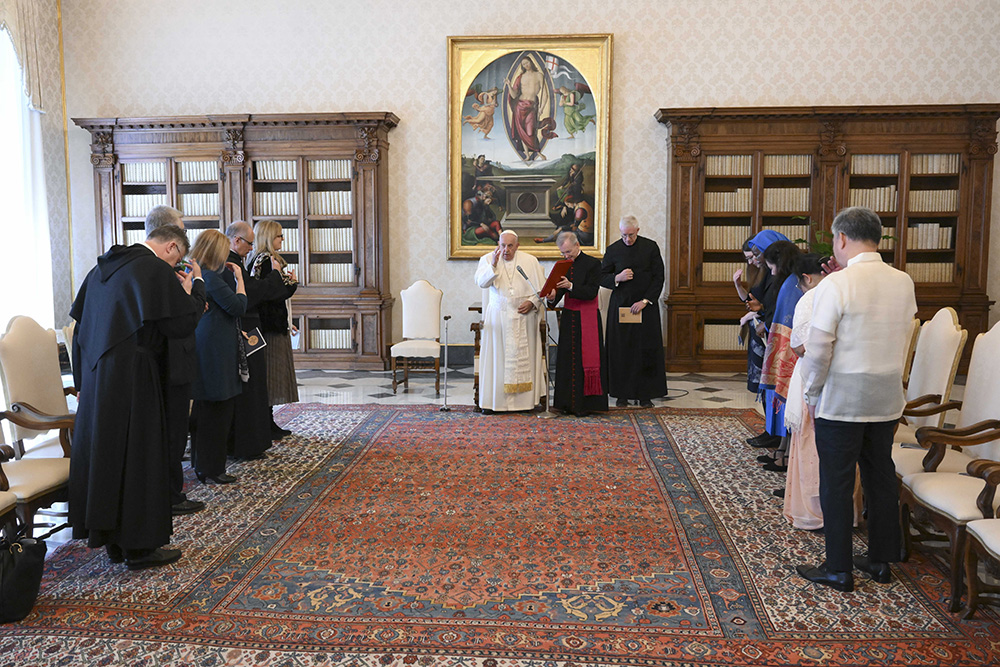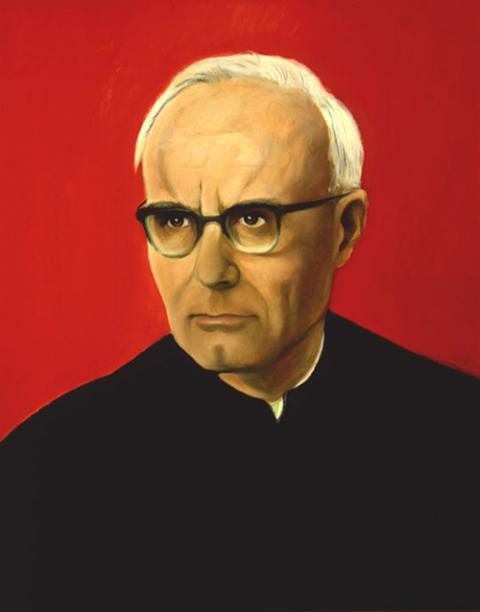
Pope Francis prays with members of the International Network of Societies for Catholic Theology in the library of the Apostolic Palace at the Vatican May 10, 2024. (CNS/Vatican Media)
Last week, Pope Francis met with the leadership team of the International Network of Societies for Catholic Theology (INSeCT), which includes more than 20 member societies from across five continents. As a theologian and an active member of two of the INSeCT societies — the College Theology Society and the Catholic Theological Society of America — I was particularly interested in learning what Francis would say to my international colleagues about the state and purpose of theology today.
In true Pope Francis form, he did not disappoint in his brief prepared remarks. The headline that ran in NCR stated, "Church needs theologians who grapple with modern world, pope says," which captures one of the most important themes of his address. The realities of our time, including those themes, subjects and discoveries that encapsulate the "signs of the times" today, ought to be engaged by Catholic theologians.
The pope emphasized that "theology is indeed a significant and necessary ecclesial ministry," which is something that I believe is often lost in debates about the purpose and practice of this academic discipline. Theologians are not merely ancillary specialists but instrumental members of the faith community, playing an essential and important role in the church's own development of doctrine and ongoing understanding of the faith we profess.
Advertisement
St. Anselm of Canterbury's well-known shorthand for theology, as expressed in his treatise Proslogion, fides quaerens intellectum — that is, "faith seeking understanding" — can be seen in the pope's remarks. Theology is dynamic, creative, imaginative and faithful to the core of what it is we are about as Christians. Francis speaks to this a striking paragraph of his address:
As we all know, Tradition is living. Consequently, it must increase and incarnate the Gospel in every land and in all cultures. The Gospel proclaims the event of Jesus, who died and rose again, and is wisdom for the life of all peoples. Theology is the discipline that deals with human existence; its light must enter the fabric of every reality investigated by the sciences. A cross-disciplinary approach is not, therefore, a fad of the moment, but an intrinsic demand of theological science, which is called to "listen" to discoveries made in other fields of knowledge in order to deepen our understanding of the doctrines of faith, while at the same time offering Christian wisdom for a human development of the sciences. The responsibility for this arduous task necessarily calls for collegiality and synodality in the work of research (emphasis added).
What the pope is describing here has been viewed as controversial by those who believe that theology is a synonym for "catechesis" or "apologetics." Such views, which are common even among some bishops and other clergy, reduce the important and complex role of theology to a mere echo chamber. Such a perspective seeks not greater understanding about the faith we profess but desires instead to merely repeat formulae and propositional claims as if they were delivered verbatim from heaven and as if we have nothing more to learn about ourselves, the world and God.
This tension that exists between the vision of theology that Francis, Anselm and most academic theologians (including me) have and that of those who are suspicious, dismissive or willfully ignorant of the purpose and practice of theology, reminds me of a now-classic article by the Jesuit theologian Fr. Karl Rahner.

Portrait of Karl Rahner by Letizia Mancino Cremer, wife of Karl Rahner's nephew Christoph Cremer. (Wikimedia Commons/Letizia Mancino Cremer)
In 1954, occasioned by the 1,500th anniversary of the Council of Chalcedon, Rahner published an article in German titled, "Chalcedon: Beginning or End" (Chalkedon — End oder Anfang?), which was later published in English with the vague title, "Current Problems in Christology." Among the themes he explores is the question of how doctrinal formulae function in Catholic theology. Using the key proclamation of Chalcedon — that Jesus Christ is both fully divine and fully human, which is often known by the shorthand "Chalcedonian Formula" — Rahner asks whether this formula is the end of theological reflection, the summation of the doctrine and cessation of any further inquiry, or is it the beginning of the task of theology? According to Anselm's definition, the Chalcedonian Formula articulates the "faith" that needs greater understanding, which is precisely the domain of theologians.
Rahner agrees with Anselm. Early in his article, he writes:
The clearest formulations, the most sanctified formulas, the classic condensations of the centuries-long work of the Church in prayer, reflection and struggle concerning God's mysteries: all these derive their life from the fact that they are not end but beginning, not goal but means, truths which open the way to the — every greater — Truth.
Anticipating Francis' frequent admonition against treating Christian faith like an "artifact" or "museum piece," as he did in a 2022 address to the International Theological Commission, Rahner warns about the dangers of treating doctrinal claims as ossified and static realities. Rahner also cautions against theological speculation divorced from doctrinal claims. "Anyone who takes seriously the 'historicity' of human truth (in which God's truth too has become incarnate in Revelation) must see that neither the abandonment of a formula nor its preservation in a petrified form does justice to human understanding," he writes.
Rahner acknowledges the humility that is necessary for the work of theological reflection, noting that our finite limitations will inevitably render any attempt to exhaust the divine mystery incomplete.
Curiously, he also anticipates the naysayers who adopt a defensive, apologetic and anti-intellectual posture of hostility and dismissiveness to contemporary academic theological research. Rahner writes, "Anyone who speaks of incompleteness in a matter like this must be prepared to be dismissed with contempt."
Indeed, around some of the most controversial issues in society and the church, within the academic and pastoral conversations that garner the most attention and even resistance, there is a lot of "dismissal with contempt." But Francis has continually taught that Catholic theology is not to be reduced to an echo chamber of propositional claims falsely presented as "complete," to borrow Rahner's framing.
Indeed, around some of the most controversial issues in society and the church, within the academic and pastoral conversations that garner the most attention and even resistance, there is a lot of "dismissal with contempt."
In that 2022 address to the International Theological Commission, the pope explicitly distinguishes the work of the catechist who "must give the correct doctrine, the solid doctrine, not possible novelties, some of which are good, but rather what is solid" from that of the theologian who "dare to go further" because "he or she is searching and trying to make theology more explicit." Crediting St. Ignatius Loyola for informing this distinction, Francis acknowledges that theologians must explore these questions and it is the responsibility of those who exercise magisterial authority to help establish boundaries.
This dynamic relationship between academic theologians and the bishops, who exercise magisterium, has been spelled out in numerous contexts over the years. What Francis has said recently aligns with what Pope John Paul II expressed in his 1990 apostolic constitution, Ex Corde Ecclesiae "On Catholic Universities." This text reminds the church that bishops and theologians have important, related, but distinct roles to play in the church. The bishops are entrusted with safeguarding the faith, but theologians "serve the Church through research done in a way that respects theological method." John Paul adds, "They also investigate the ways in which theology can shed light on specific questions raised by contemporary culture." "Bishops," we are told, "should encourage the creative work of theologians."
What comes across in Ex Corde Ecclesiae, even if it's not always fully lived out in practice, is a call for mutual respect and dialogue between bishops and theologians, recognizing the appropriate and respective roles and responsibilities each has. Sadly, those who "dismiss with contempt," as Rahner says, theologians who are "going beyond" ( Francis) or being "creative" (John Paul), tend to emphasize the role of the bishops at the expense of the role of the theologians.
Francis has been clear in calling all in the church, including bishops and theologians, to embrace the call of the Holy Spirit and for theologians to engage in constructive and contextual scholarship.
The opening lines of Francis' 2023 motu proprio Ad theologiam promovendam addressed to the Pontifical Academy of Theology summarizes well the authentic purpose and goal of Catholic theology today:
To promote theology in the future, we cannot limit ourselves to abstractly repeating formulas and schemes from the past. Called to prophetically interpret the present and to see new paths for the future, in the light of Revelation, theology will have to engage profound cultural transformations.
The purpose and goal of academic theology is to engage in the rigorous intellectual and spiritual inquiry into questions that help us seek greater understanding of those things we hold in faith. We still have a lot to learn about ourselves, the world and God, which means the work of theology must continue boldly, creatively and faithfully, even if it makes some people uncomfortable along the way.








